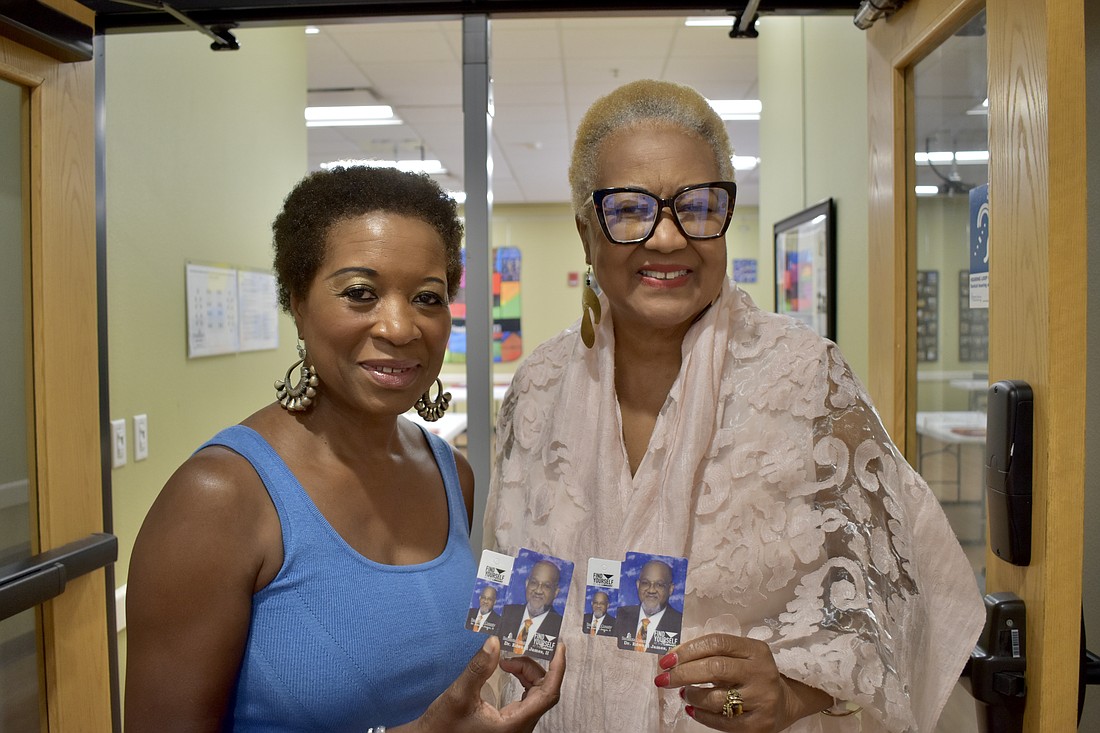- May 2, 2025
-
-
Loading

As Renée James Gilmore looks down at the library card of her late father, Edward James II, she feels her attention drawn to the words printed on it: “Find yourself at the library.”
Those words represent the legacy her father left behind when he died in 2018 — as the first Black person in Sarasota County to receive a library card, she said.
James was always an avid reader, said Gilmore. In fact, she cannot remember a time where his morning routine did not involve saying his prayers before picking up the newspaper — not just one paper, but multiple papers.
Another activity he regularly embraced, and did not flinch from, was pushing for change, having come from a family that was active in the community. His mother, Annie Blue McElroy, was a teacher in Sarasota’s segregated schools, while his grandparents, Jack and Mary Emma Jones, were activists.
That's why one day in the late 1950s or early 1960s when he was temporarily home from Florida A&M University in Tallahassee, the Newtown resident decided it would be the day he would integrate the Sarasota County library system.
“Ed was always in the community doing something,” said James’ wife, Helen James. “He always had a love for everything that he did, because that's what he was accustomed to, and that’s what he was raised to be a part of.”
At the time James gained his library card, there was a bookmobile that offered books around town, as well as a minimal library in Newtown, but he headed to the library that was reserved for whites only, located in the area that now holds the Hyatt Regency Sarasota.
James walked into the building and asked to check out a book. The librarian, a white woman, replied that he would need to visit the colored library in Newtown.
He responded by saying, “That’s hardly a library.”
A discussion followed, with James stating that his family were taxpayers and had every right to access the same resources, and it led to the librarian eventually calling the city administrator, Ken Thompson, who requested to speak with James.
“We have a community library because somebody stepped up, and that was in a time when you could get killed, and people were being killed for doing far less than a young black man speaking to a white woman about his position on how his family pays taxes,” Gilmore said.
According to Gilmore, Thompson replied to the effect of, “I understand you’re having some issues down there."
Her father gave the same response he’d given to the librarian, she said — that he needed to check out some books from the library.
She said Thompson asked him to come to the City Hall for a talk, which she called “just indescribable for the time,” noting that Thompson did not pass him off, first and foremost, because he was black, but neither because he was a student.

"I think that was the kind of leadership that was good for Sarasota on both of their parts,” she said. “These are two people who were able to sit down and hash some things out. And so, that day, my father got a library card.”
The legacy he passed on is about more than the power of reading itself, she said — it is also about understanding.
Even when they were children, he made sure that Gilmore and her brother, Mark James, knew about their history. He would teach them not only to read, but to think critically about what they read.
She and Mark James became and remained avid librarians, she said, often reading recreationally.
As children, they attended school in New York for a time while their father worked with civil rights leaders on different initiatives. The children established an ongoing habit as they spent days in New York Public Library, researching the contributions of individuals like Revolutionary War freedom fighter Crispus Attucks, playwright Lorraine Hansberry, and Arctic explorer Matthew Henson.
“To have a library card with his image means everything to me, because it’s a reflection of the life he spent making sure that his own children and his own family members were able to read and access information, and then digest that information and make sense of it,” she said. “Not just read words on paper, but digest the world around them. Not just us, but the entire community.”
“I'm just overwhelmed to be a part of this legacy,” said Helen James. “Of course, I married into the James family. My husband, and Renée and I, are standing on the shoulders of people who have paved the way for us to come into a library, for us to check out books, for us to understand our history.”